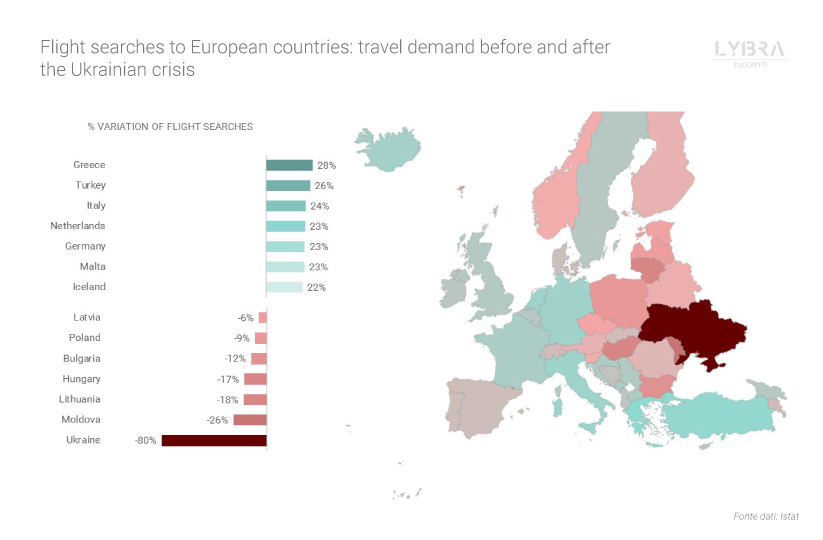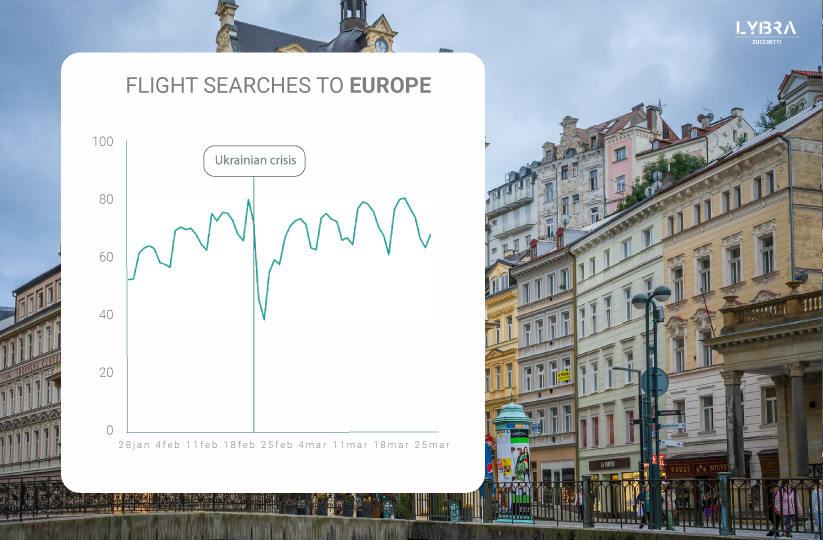When a few weeks ago we witnessed, incredulously, the outbreak of war in Ukraine, the whole tourism world trembled: all European operators of the travel supply chain saw in the war another insurmountable obstacle to the post-Covid recovery. After two years of pandemic emergency, 2022 seemed to have started off on the right foot: the improvement in the health situation was slowly driving tourists to plan trips and everyone looked with hope at the spring/summer seasons.
The recent war events disrupted the market, once again raising a climate of tension and insecurity: with the invasion of Ukraine and the involvement of NATO, travel demand collapsed rapidly in all European countries, leaving the tourism market in a situation of strong uncertainty.
DEMAND FOR TRAVEL REACTS TO THE CRISIS
None of the European countries has been spared by the strong shock wave that the Ukrainian crisis has generated: political instability in Eastern Europe has caused demand to collapse even in geographically very distant from Ukraine countries and has directly involved the countries of Central Asia.
After about thirty days from the contraction in demand, we can take stock of the situation and assess how tourists have reacted. According to data regarding flight searches, which are strictly related to travel intentions of tourists, after a few days of insecurity demand resumed its normal trend. As you can see from the graph, the search curve has resumed its usual trend and has recovered pre-crisis search volumes. Demand growth slowed slightly (from an average of +2.8% per day to +1.4%), but in absolute terms we returned to an average of 6.5 million searches per day.
This does not mean that the war is not negatively affecting European tourism but certainly, the reaction of tourists reduces the great fear born in the first days of the conflict. As we will see in detail, some countries are still suffering a lot from this situation and will certainly experience important repercussions on the entire tourism sector, but this is not the case for the whole Europe: there are, indeed, some countries where tourism demand is growing.

GREECE, TURKEY AND ITALY IN FIRST POSITIONS
For some tourist destinations, the demand for travel after the Ukrainian crisis has had, in addition to a rapid recovery, also an increase compared to pre-crisis volumes: flights to Greece, for example, have increased by 27.9% in the last thirty days. For Turkey, however, the increase was 26.3% and for Italy 23.8%. In general, all Mediterranean countries recorded growth, even those in the Balkans: Croatia +18%, Serbia +18%, Albania +16%.
Searches also increased for Central European destinations: Germany +23%, the Netherlands +23%, Iceland +22%, France +20%, Belgium +17%, the United Kingdom +17%, Sweden +17%.
On the contrary, Eastern European destinations are experiencing sharp decreases in research volumes: in addition to Ukraine (-80.4%), research also decreased for Moldova (-25.7%), Lithuania (-17.6%), Hungary (-17.5%), Bulgaria (-12.2%) and Poland (-10.1%).
About Destination
Destination is a market intelligence project created by Lybra – developers of the most complete, machine learning, data-centric Revenue Management System (RMS) available on the market – to share real-time, region-specific statistics, information and trends in the world of tourism.
Every day, Lybra analyzes millions of datasets – data collected from thousands of hotels’ PMS and flight search data from a leading metasearch booking engine – to help hoteliers “look ahead to better understand the present;” in other words, Lybra helps hoteliers understand the upcoming demand for their destination and gives them the revenue management tools and actionable insights necessary, to maximize bookings and revenue.
The aim of Destination is to give hoteliers and DMOs a more expansive view of tourism news and trends in different regions around the world. Destination produces weekly Travel Demand Reports, which share tourism developments for a specific country/region and analyze how the region’s travel news has impacted tourist demand. Follow Destination on LinkedIn to gain access to the upcoming Travel Demand Reports, which are published every Tuesday.










